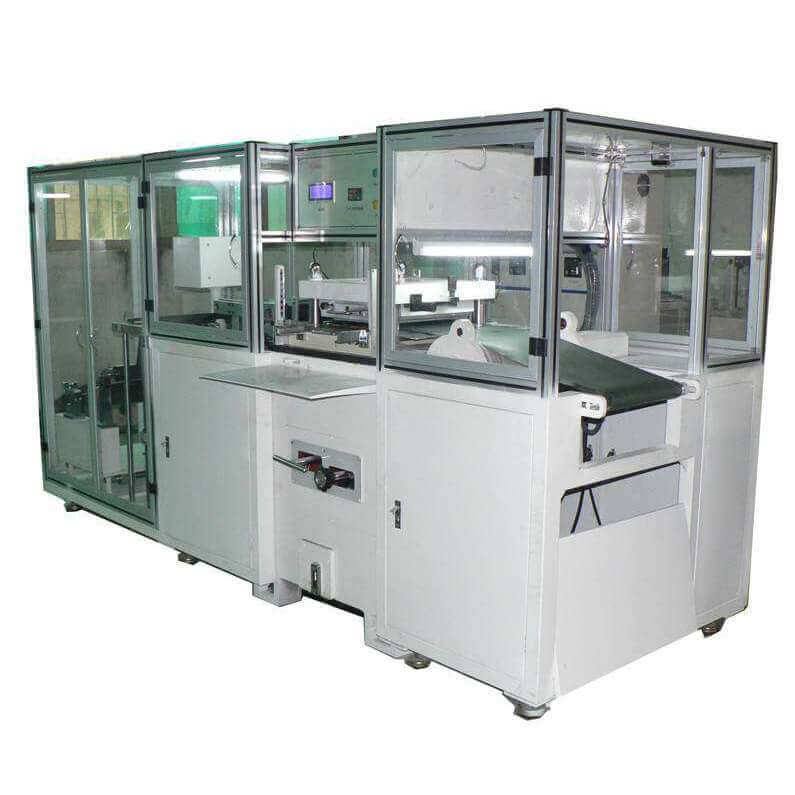Site Blog
Blog récent
Ligne de machines de fabrication de production de cellules cylindriques automatiques
fabrication et équipement de laboratoire de batterie de Li-ion 18650
Organigramme de la pile bouton au lithium-ion et liste des machines
fabrication et équipement de laboratoire de batterie de poche de li-ion
dec 2016 usa client acceptation d'usine de l'empileuse automatique
Contactez-nous
- Si vous avez des questions, veuillez communiquer avec nous, toutes les questions recevront une réponse
- Messagerie : David@tmaxcn.com
- Messagerie : Davidtmaxcn@gmail.com
- Ajouter : No. 39, Xinchang Road, Xinyang, Haicang Dist., Xiamen, Fujian, China (Mainland)
produits chauds
Machine de laboratoire de batterie au lithium
EV Car battery manufacturing plant
August 22,2023.
The key machinery and technologies involved in an EV car battery manufacturing plant include:
Battery Assembly Line: The battery assembly line is the core of battery component manufacturing. It includes mechanical devices for assembling battery cells, modules, and packs. These assembly lines need to be highly automated to enhance production efficiency and quality.
Battery Cell Assembly Equipment: Battery cell assembly equipment is used to assemble the fundamental unit of a battery, typically a lithium-ion battery cell. These devices involve the stacking and encapsulation of electrode sheets, separators, and electrolytes.
Battery Module Assembly Equipment: Battery modules are components of battery packs and often contain multiple battery cells. Battery module assembly equipment is used to assemble multiple cells into modules and ensure their connectivity and insulation.
Battery Pack Assembly Equipment: Battery packs are the final assembly of a battery system, containing battery modules, control systems, and casings. Equipment for assembling battery packs needs to ensure high levels of safety and sealing.
Battery Testing Equipment: Battery testing equipment is used to perform various performance and safety tests on batteries, including capacity testing, charge and discharge testing, thermal management testing, and safety tests like thermal runaway testing.
Precision Material Handling Equipment: Battery manufacturing involves the precise handling and processing of materials such as electrode materials and electrolytes. This includes processes like coating, cutting, and stacking.
Automation and Robotics: Highly automated manufacturing processes involve automation equipment and robots to improve production efficiency and reduce human errors.
Precise Quality Control Systems: Advanced quality control systems are used to monitor and maintain quality standards for batteries, ensuring compliance with performance and safety requirements.
Energy Management Technologies: Battery manufacturing consumes a significant amount of energy, so energy management technologies, including energy recovery and efficiency improvements, are essential for reducing production costs and environmental impact.
Data Analysis and Internet of Things (IoT): Data analysis and IoT technologies are employed to monitor the production process, predict maintenance needs, optimize production efficiency, and improve quality.
Battery Assembly Line: The battery assembly line is the core of battery component manufacturing. It includes mechanical devices for assembling battery cells, modules, and packs. These assembly lines need to be highly automated to enhance production efficiency and quality.
Battery Cell Assembly Equipment: Battery cell assembly equipment is used to assemble the fundamental unit of a battery, typically a lithium-ion battery cell. These devices involve the stacking and encapsulation of electrode sheets, separators, and electrolytes.
Battery Module Assembly Equipment: Battery modules are components of battery packs and often contain multiple battery cells. Battery module assembly equipment is used to assemble multiple cells into modules and ensure their connectivity and insulation.
Battery Pack Assembly Equipment: Battery packs are the final assembly of a battery system, containing battery modules, control systems, and casings. Equipment for assembling battery packs needs to ensure high levels of safety and sealing.
Battery Testing Equipment: Battery testing equipment is used to perform various performance and safety tests on batteries, including capacity testing, charge and discharge testing, thermal management testing, and safety tests like thermal runaway testing.
Precision Material Handling Equipment: Battery manufacturing involves the precise handling and processing of materials such as electrode materials and electrolytes. This includes processes like coating, cutting, and stacking.
Automation and Robotics: Highly automated manufacturing processes involve automation equipment and robots to improve production efficiency and reduce human errors.
Precise Quality Control Systems: Advanced quality control systems are used to monitor and maintain quality standards for batteries, ensuring compliance with performance and safety requirements.
Energy Management Technologies: Battery manufacturing consumes a significant amount of energy, so energy management technologies, including energy recovery and efficiency improvements, are essential for reducing production costs and environmental impact.
Data Analysis and Internet of Things (IoT): Data analysis and IoT technologies are employed to monitor the production process, predict maintenance needs, optimize production efficiency, and improve quality.
The effective application of these machinery and key technologies is crucial to ensuring high-quality and efficient electric vehicle battery manufacturing. Battery manufacturing plants need to continuously update and improve these technologies to meet the growing demand for batteries and enhance battery performance.
 English▼
English▼





 +86 13174506016
+86 13174506016 David@tmaxcn.com
David@tmaxcn.com

